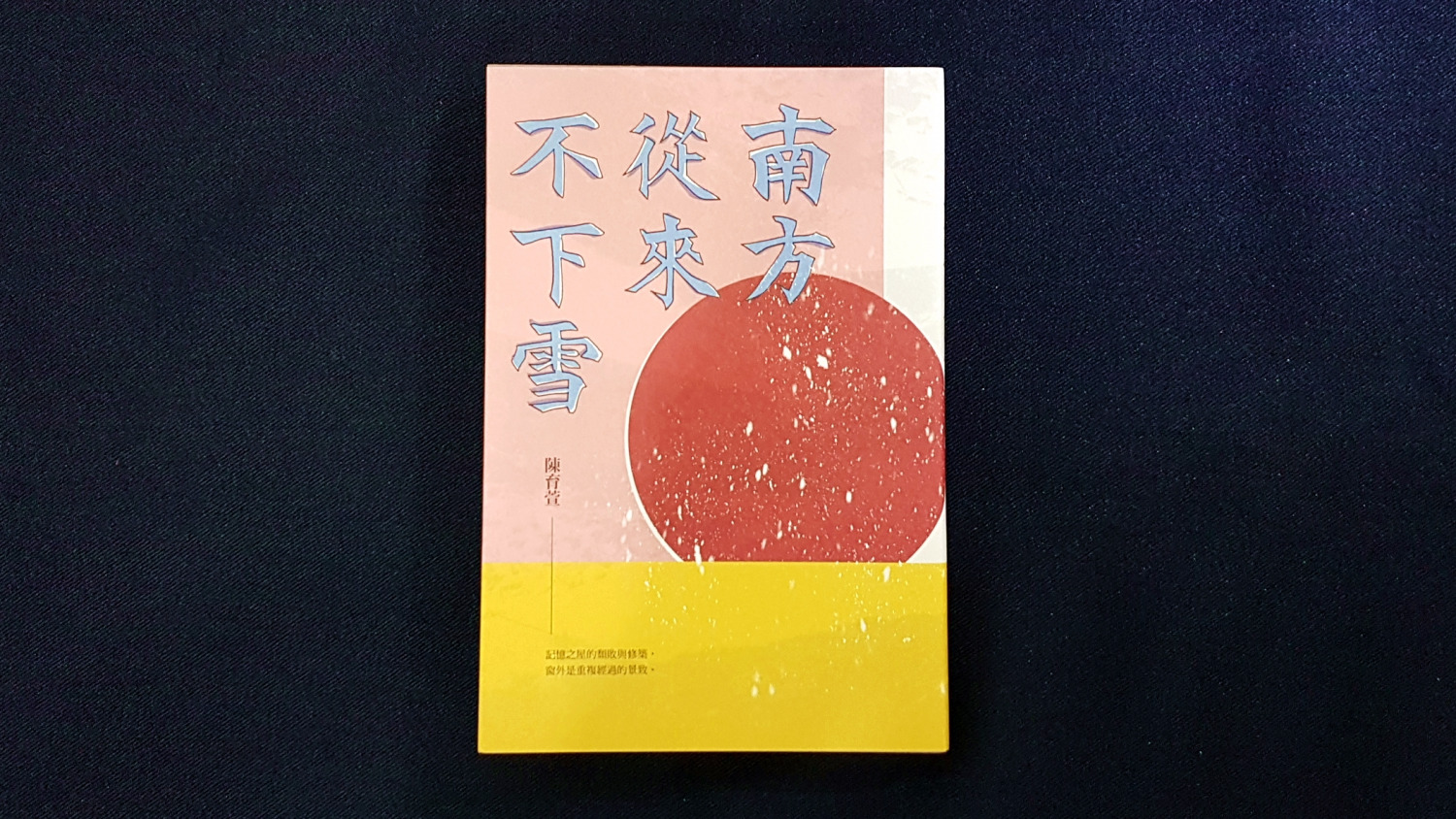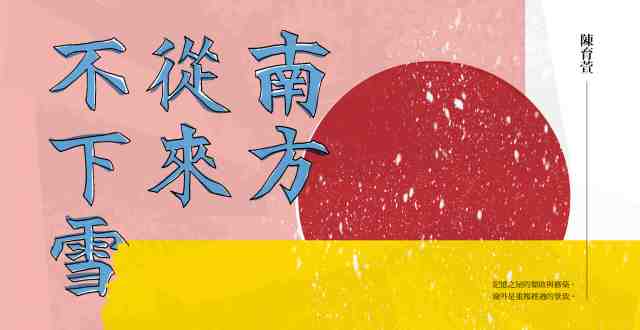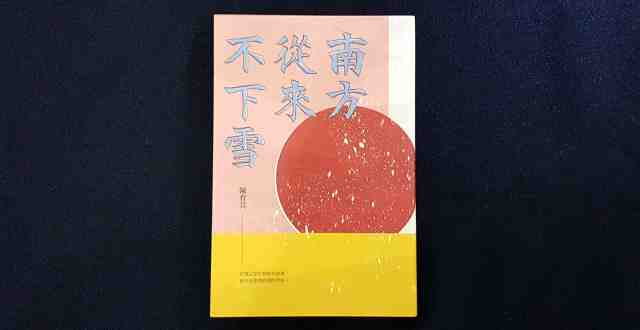
SAMPLE》It never snows in the South (2/2)
He was proud to wear the high school uniform because it was proof that he had entered the best provincial high school, the one all his peers dreamed of; all the elders in the family would be happy to show off this news.
Lin Guo-yi did not want to be different; he didn't want to dress up or attempt to climb over the wall to skip classes. He just wanted to wear the uniform neatly and go to school on time. This realization made him feel like he was just like other high school students.
At the end of the first semester's midterm exams, unsurprisingly, he received high marks and submitted his scholarship application. Seeing that the announcement deadline had passed, he went to the Registrar's Office three times. However, the response remained unchanged, "Lin Guo-yi, I'm sorry, but your scholarship application has not been approved." The monotonous, flat voice made him question, "Are you sure? Did you miss it? Can I see the list?" The man pushed his glasses away and placed them on the table, "Are you handling it, or am I handling it? I'm telling you, your scholarship will never, ever pass. Do you understand?" The man ruffled a strand of hair on his greasy head and dismissed Lin Guo-yi.
Lin Guo-yi walked out of the door and kept moving forward, surrounded by laughter and bustle on campus. He remembered his classmates who always cursed using four-letter words and mumbled them under his breath. The more he learned, the more fluent he became, and as the curses filled the air around him with hostility and pure pleasure, he imagined that he was back in front of the clerk again, throwing all the vile and vulgar greetings right at his face.
This imagined scene replaced the loss of the previous moment, and out of risky rebellion, he headed for the school gates, where everything surprisingly went well, and he broke through the school gates. Now that this moment was complete, he was determined not to return to school that day.
His uniform stood out in the bright sunlight, and he received suspicious glances from every passerby. Not wanting to respond to the overbearing stares, he turned into an alley—laundry poles out in the open, pickles in the sun, a couple of old men playing chess at a table, shaded backyards, dark alleys, an unknown direction, and it wasn't clear if he was moving forward or just spinning around, but he didn't care. He followed his own will, and the time he spent wandering would not be wasted. He walked simply for the sake of walking.
There was no purpose, no need to rush in despair when he thought about it. His stewed mind gradually cooled down, and the firewood of the foul language he had added to his fight was blown away by the breeze as he climbed up a banyan tree branch. Lin Guo-yi spread out his limbs, using his back as a fulcrum, and lay relaxed and half-reclined in the embrace of the tree.
The wind made him drowsy, and for the first time during the day, he felt a vine-like weariness enveloping him without hesitation, causing him to linger in a haze of sleep. The fence between sleep and wakefulness was low, and he crossed over into the hazy, shrinking blackness. Somehow, he knew he was lost. His feet seemed to move, but he couldn't navigate the blackness, which was indistinguishable in distance and height. Near him, a blackness of specific words and phrases shot malice into his cochlea without hesitation. Listening to his bones vibrate, he wanted to hide, to find a place where there was no sound and rest. He tried to wave his arms and legs, he wanted to go somewhere, anywhere would do. The more anxious he became, the more the sounds penetrated him with malignant intent, covering his mouth, nose, and ears mercilessly. The whispering group became his internal alarm, a constant vibration that shattered his core to the bone and into the darkness. He was certain it wasn't the night, but the darkness, the darkness from which no one could save him, the darkness that signaled the end of everything.
The venomous words persisted, stripping away what little remained of his consciousness. In a flash, he woke up.
For a moment, he couldn't discern if he was awake or asleep. Had that been a real event, and was this just a brief dream? He attempted to turn over and only then realized from the numbness in his left hand that he was indeed in a human body. He lay still for a while, reached out to the low cupboard near the bed, pulled the small table lamp, and suddenly a portion of the room was brightly illuminated. He got up, bent his upper body to his knees, and sat motionless.
He felt a bit disoriented. Wasn't he still in uniform amidst the trees? Why was he in the bedroom?
He could even vaguely recall the goosebumps on his skin caused by the wind among the trees. Yet his wife was tangible, and he focused his gaze on her, attempting to make the contours of reality clearer. Instead, this effort ushered in an even more intense, driving cacophony of creepy-crawlies into his mind. At moments like these, his attempts eventually washed out in white, and his poorly functioning brain brought back the image of his father leaving the house in the middle of the night in a panic.
The military boots that stepped on the tatami-mat beds shattered the family's dreams like the hooves of a horse. Lin Guo-yi was about to wake up when his mother covered his eyes. Her shaking hand rested on his eyeballs as she told him to close his eyes. His eyes didn't obey, and through his squinting eyes, he saw his mother's other hand hurriedly searching for something. The boots thudded against the door, and his mother, no longer caring about him, grabbed his father in two strides and tried to put a coat on him. In the darkness of the house, he felt fear for the stranger who was trying to hold his mother in place, but she escaped the threat and, wide-eyed, insisted on stuffing what she had just searched for into Father's pocket. Father reluctantly glanced back at them and said reassuringly, "I'll be back soon, don't worry." After that, he was not walking but being dragged by strangers in military boots, the barrels of their rifles grinding against the neatly woven tatami mats with the sound of something being shredded.
He would always remember that winter night.
He told himself that the feeling had never gone away, but he seemed to have inadvertently lost his father's image. Whenever he withdrew from his dreamlike state, the scene around him took on a hesitant shape, firmly linked to his sleeplessness.
Why?
As he grew older, he asked himself why he was not the one who was removed from the house in his sleep.
He was the one who was left behind, the one who continued to live in reality. He deserved normal wakefulness and sleep, but how could he have failed to live up to the habit of waking up at the slightest disturbance, as if it were imprinted on him?
After his wife gave birth to their eldest daughter, he automatically got up to check on her when she cried in the middle of the night. Her moonlight-colored face was moist with tears, and when he touched her, the moistness became more uncontrollable. In the dim light from the window, he turned on the light, checked her diaper, and then looked through her socks and bedding. He didn't know if the baby was having a fever or feeling hungry, or if she was having the same nightmares. He examined and judged each possibility until he could pick up his daughter in the dark and determine with radar-like accuracy whether she needed warm milk or something else.
For this reason, his wife often closed her eyes in peace and slept with deep breathing and without the slightest fluttering of the eyelids. He lay down again, sometimes taking a closer look, so close that his nose caught a cloudy, deep breath that seemed to forgive him for not having slept well for a long time. This weighty breath found its way into his dreams.
After more than twenty years of sleep, not long after his retirement, Lin suffered from an unexpected bout of insomnia, consisting of tingling thistles centered in his temples during the day, once, twice, and then also during the night, twisting and turning each and every wire of the nerves that were functioning so peacefully.
"The headaches aren't getting any better?"
He looked at the doctor, who was about the same age as his daughter, and saw in her eyes a mildly bemused distress. "It doesn't matter, doctor; it's just an old problem. Can you prescribe me another week's worth of medication, please?"
The doctor tapped her hands on the keyboard, moving several prescriptions back and forth as if they were chess pieces. She was playing a move, a move specifically to confront him with his sleeplessness.
"Uncle, take the medicine when you go back. If it still doesn't improve, we'll try another approach." Such a packet of medicine was lying on the bedside table. He reached out, took out the pills, and swallowed them. Lin Guo-yi gulped down all the water in the glass bottle, his belly bulging like a frog, while he ordered himself not to think about anything else.
(to be continued. )




